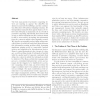Free Online Productivity Tools
i2Speak
i2Symbol
i2OCR
iTex2Img
iWeb2Print
iWeb2Shot
i2Type
iPdf2Split
iPdf2Merge
i2Bopomofo
i2Arabic
i2Style
i2Image
i2PDF
iLatex2Rtf
Sci2ools
105
click to vote
MOBIDE
1999
ACM
1999
ACM
Pervasive Computing: What is it Good for?
The first mass-produced pervasive computing devices are starting to appear—the AutoPC, the Internet-connected ScreenFridge, and the combination Microwave Oven/Home Banking terminal. Although taken separately they appear bizarre, we believe they will play an important role in a world of pervasive computing. Specifically, these devices will accept or deliver information in the context in which it will be most useful, decoupling the information from the context in which it was originally created. We describe an extensible and modular architecture called Rome (to which all roads lead) that addresses this information-routing problem while leveraging significant existing work on composable Internet services and adaptation for heterogeneous devices. Rome’s central abstraction is the concept of a trigger, a self-describing chunk of information bundled with the spatial and/or temporal constraints that define the context in which the information should be delivered. The Rome architectur...
Computer Networks | Heterogeneous Devices | Mass-produced Pervasive Computing | MOBIDE 1999 | Pervasive Computing Devices |
| Added | 03 Aug 2010 |
| Updated | 03 Aug 2010 |
| Type | Conference |
| Year | 1999 |
| Where | MOBIDE |
| Authors | Andrew C. Huang, Benjamin C. Ling, Shankar Ponnekanti |
Comments (0)

